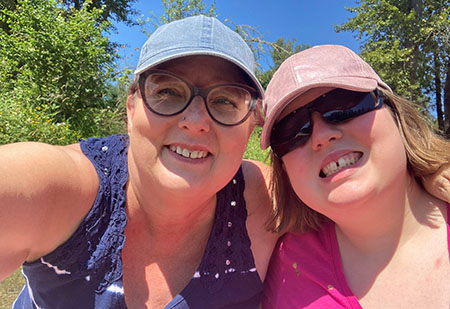
making up for lost time, Melinda Zugelder and daughter Claire.
After A Hard Fall, It’s Springtime for this Mom, Daughter
NOTE: This is the second of two stories about St. Vincent de Paul employees who have experienced homelessness, and how the experience influences their daily lives. To read the first story, click here.
“No matter how far you fall, it is possible to recover.”
A staff member at St. Vinnie’s Lindholm Center, Melinda Zugelder wouldn’t have believed her own words during the four years she was homeless. At the time, she suffered from a chemical addiction and an emotional one – to the very person whose attitude kept them on the street.
That wasn’t the future Melinda envisioned as a child living with her mom in the San Francisco Bay area and making frequent visits to see her dad. She imagined herself a successful businesswoman, married to a kind man, and raising a big family. Never mind the alcoholism that ran rampant through the family, or whatever factors led her own parents to split.
The reality was complicated and harsh. In fall 2011 when her mother died, Melinda was a divorced mom and live-in caregiver, housing stability that allowed for visits with her daughter. Two months later she got fired.
In a trifecta of catastrophe, Melinda lost housing, income, and family contact. Eventually, she lost the will to remain sober and began a life on the streets with her freedom-loving boyfriend. Combined, his habitual abuse and Melinda’s addiction were not enough to compel change.
“When your brain is altered by drugs, getting and using them is all that matters,” she said. “I lost my hope for a better future.”
When you break down the psychological ramifications of homelessness, “lost hope” is an understatement. In addition to the domestic abuse dealt by the boyfriend, Melinda was called names and treated as “less than” by the larger community. She experienced the prejudice of people who said she should just get a job and get off the street, as if survival on the street isn’t like working overtime all the time.
Add Post Traumatic Stress, the PTSD more commonly associated with combat experience. It came with crawling into a makeshift place to sleep then lying awake, waiting for intruders, the police, robbers, whatever may come. More than a year on the street plus several in a shelter left Melinda skittish, even now, in her own apartment.
Being separated from her daughter finally caused Melinda to tip. With the help of Womenspace, she left her abuser for a safe place. She enrolled in a long-term inpatient treatment program that proved effective in helping her achieve and maintain sobriety, and ground herself in the Christian faith and forgiveness. Most importantly, she was able to forgive herself.
Melinda was also accepted for Rapid Rehousing assistance, which paid rent and utilities while she worked and took care of herself. By the end of the two-year program, she was employed full-time and able to pay her own way.
Data analyst and administrator for St. Vincent de Paul’s Social Service Office, Melinda spent the initial COVID-19 lockdown working at SVdP-operated respite centers for unhoused individuals and conducting check-ins outside the Food Room. Now, she’s back at the computer, multi-tasking in myriad ways.
She takes every person at face value, consciously setting aside prejudice in favor of compassion and empathy. She endeavors to be the “cheerleader” that every person needs to make meaningful changes in their own lives.
Short of a cheerleader, Melinda would advise establishing a personal system of positive goals and meaningful rewards. The continuous sense of achievement builds self-confidence and momentum, she said.
We cannot know what others have been through, and that’s certainly the case with Melinda as she motors from work site to work site in her red VW Beetle. She’ll be the first to tell you, however, that “all deserve to be treated as equals.”
“Be compassionate. Be kind.”
